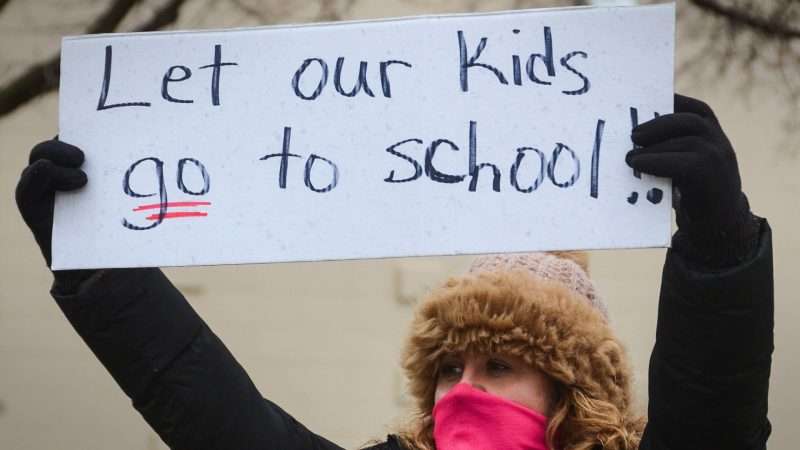Please enjoy the latest edition of Short Circuit, a weekly feature from the Institute for Justice.
New on the Bound By Oath podcast: the origins of Section 1983—originally known as Section 1 of the Ku Klux Klan Act of 1871.
New on the Short Circuit podcast: Rudy Giuliani is in hot water. And we talk about the undertalked about Reception Clause.
- In which the D.C. Circuit determines that the Army Corps of Engineers acted unlawfully in granting an easement to the Dakota Access Pipeline underneath Lake Oahe but that we shouldn’t be too hasty in doing anything about that unlawfulness.
- The U.S. can prosecute crimes committed on seagoing vessels that sail under the American flag, but what about “stateless” vessels that fly no flag at all? It can prosecute crimes there too, says the First Circuit, which is bad news for this defendant, his stateless boat, and his honkload of stateless cocaine.
- Some legal commentators would have you believe that it’s never RICO, but this First Circuit opinion demonstrates that if the prosecution introduces copious evidence of your organization’s decade-long work as a “mega-gang,” then it is probably RICO.
- In criminal statutes, does the word “willfully” mean “on purpose” or “with bad intent”? Third Circuit: Yes.
- Norfolk, Va. police arrest two men after a search of their car uncovers 300+ grams of fentanyl, four cell phones, a loaded gun, and $1,800 in cash. Though the men admit to owning the other items, neither claim ownership of the fentanyl. Fourth Circuit: The men clearly knew each other and were acting suspiciously, so it was reasonable for the cops to assume that they were engaged in a common enterprise and the fentanyl belonged to both.
- Citizen of El Salvador sought to avoid deportation on the ground he faces persecution as a former member of the MS-13 gang. The Board of Immigration Appeals denied relief, reasoning that the social group of “former Salvadoran MS-13 members” is too amorphous to warrant such relief. Fourth Circuit: Even assuming that decision is entitled to Chevron deference (a question we need not decide), the Board’s decision is unreasonable and cannot stand. The group is hardly amorphous, as it’s limited to former gang members. Dissent: Chevron.
- Woman visiting an inmate is strip searched, forced to remove her tampon for inspection, and made to “squat and cough.” Fourth Amendment violation? Fourth Circuit: Qualified immunity. The guards had reasonable suspicion to believe that she was attempting to pass the inmate contraband given rumors that the inmate was smuggling drugs and that a security guard said he saw the woman unbutton her waistband an hour into her visit. Dissent: This was significantly more intrusive than a standard strip search—should’ve gone to a jury.
- Is using someone else’s Social Security number a crime involving moral turpitude? Fifth Circuit (further entrenching a circuit split): Sure is. Dishonesty is an essential element of the crime, and it is thus turpitudinous.
- A Houston peroxide manufacturer discovered that its hurricane preparedness plan was inadequate when Harvey pummeled Texas and the facility’s materials blew up. Neighbors sue, and the trial court gives the okay for a class action. Fifth Circuit: Not so fast. When expert opinions are used to certify a class, the court must first ensure that those opinions would be admissible at trial under Daubert.
- Tennessee couple seeks bankruptcy protection, claiming less than $6,000 in assets. Zoinks! They actually control millions through a complex web of family trusts and shell companies. And the couple’s largest creditor is having a bad time at the Sixth Circuit. One decision says the creditor can’t pierce the corporate veil in reverse (i.e., get assets from some of those entities to satisfy the couple’s debts). And another won’t allow the creditor to pursue a malpractice claim against the couple’s bankruptcy attorneys.
- Back in November, a panel of the Sixth Circuit said that a district court could not deny a COVID-related request for compassionate release with a “barebones” form order. But that panel, says a different panel of the Sixth Circuit, was wrong, and one-sentence orders denying compassionate release are totally cool. (In dissent, Judge Moore, who wrote the initial panel opinion, suggests they got things right the first time.)
- Redacted opinions aren’t too common, but here’s one from the Sixth Circuit about a sentence reduction for an inmate who assisted police after hearing another inmate say, “[I]f you ever want to get rid of a body, hogs is the way to go.”
- A home healthcare agency declines to pay nurses for the overtime they worked because it “couldn’t make money” if it did. She sues, wins with a settlement. The district court orders attorneys’ fees, but then reduces them to 35% of the total settlement amount because that’s what judges in that district “typically approve.” Sixth Circuit: That’s not a good reason. Grant the fees as requested, add some for this appeal, and please don’t appeal again.
- Sixth Circuit: There’s not a lot that will void the absolute immunity that prosecutors normally enjoy, but threatening to charge someone with double murder unless they falsely implicate someone else (who served 41 years before being released) will surely do it.
- This Ponzi scheme began—like so many others—when an investment manager decided to paper over a loss rather than fess up to his investors. He invented a fictional investment in an Australian hedge fund, and he used funds from new investors to pay the old. The scheme ran for over seven years before it finally came crashing down, at which point the district court sentenced the gentleman to over seven years in prison. Seventh Circuit: Affirmed.
- When an elected official blocks someone on Twitter, do they violate the First Amendment? Eighth Circuit: Not in this case; the Twitter account here was the elected official’s private account, started in her capacity as a political candidate, not as an elected official. Dissent: But the block occurred after she was elected and started using the account for government business. That violates the First Amendment.
- Pro tip from the Eighth Circuit: When seeking qualified immunity for allegedly firing a tear-gas canister at a TV news crew for no good reason, do not rely on a set of factual claims contradicted by the video shot by that very TV news crew.
- Is a private entity constrained by the First Amendment because it rents its space from the government? Still no, says this Ninth Circuit panel.
- Airman faces court martial for sexually assaulting four female airmen. The jury is instructed that if they determine he committed one of the crimes, they may consider that as evidence showing his propensity to having committed any of the other crimes. They convict. A year after his conviction becomes final, the Court of Appeals for the Armed Forces holds the instruction unconstitutional in a different case. Ninth Circuit: Alas, the decision doesn’t apply retroactively.
- Another week, another appellate decision involving churches and COVID-19 restrictions. This time, the Ninth Circuit gives a mixed ruling, enjoining some restrictions while upholding others, including a ban on “singing and chanting.”
- Officers shoot a participant in an illegal “sideshow”—an event where drivers perform donuts, burnouts, and other similar maneuvers—while the driver is moving at a speed of “up to five miles an hour.” It’s unclear if the victim knew the police (in an unmarked car with a yellow siren) were actually police, and the police claim they worried he was going to run them over. Ninth Circuit: No qualified immunity. It is clearly established that officers cannot shoot the driver of a slow-moving car when they could reasonably step out of the way instead.
- Kansas militiamen plot to bomb an apartment and mosque complex, acquiring 300 lbs of fertilizer and drafting a manifesto urging Americans to stop “the sellout of this country.” Unbeknownst to them, a militia member is an undercover informant. Convictions and lengthy sentences all around. Tenth Circuit: The defendants were eager to commit the crime and thus not entrapped, and their manifesto—addressed to the government and referencing policy—qualifies them for the terrorism sentence enhancement. (More in this longform piece.)
Are you looking to kick-start a career in public interest law? Are you motivated by working on cutting-edge constitutional cases, stopping government abuses, and championing individual rights? Good news, IJ is hiring for Law and Liberty Fellows to join in August/September 2022. This Fellowship is IJ’s preferred path for recent graduates or post-clerkship candidates with less than two years of experience. The Law and Liberty Fellowship is based at our headquarters in Arlington, VA. We are currently looking for Fellow to join us in August 2022. The program runs through August 2024. Upon completion, Fellows are considered for permanent employment. Visit the Careers section of our website, www.ij.org/jobs, to learn more and apply. Application is open through March 12.
from Latest – Reason.com https://ift.tt/2MwW9wl
via IFTTT



